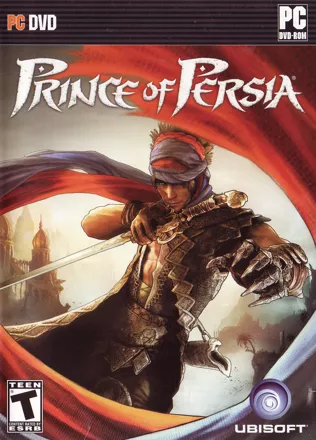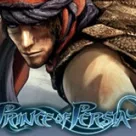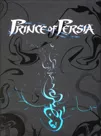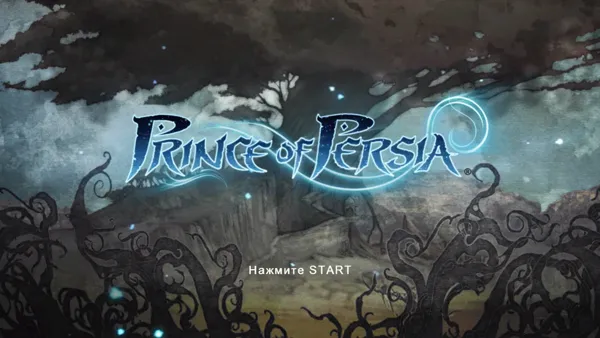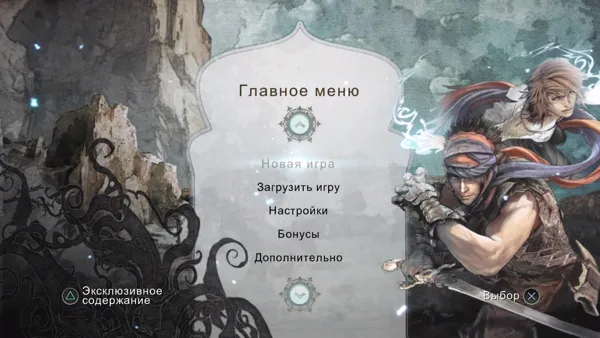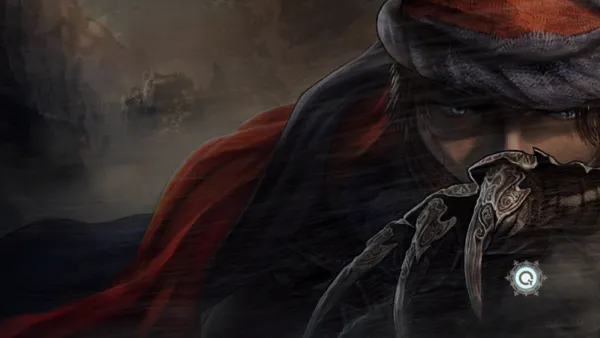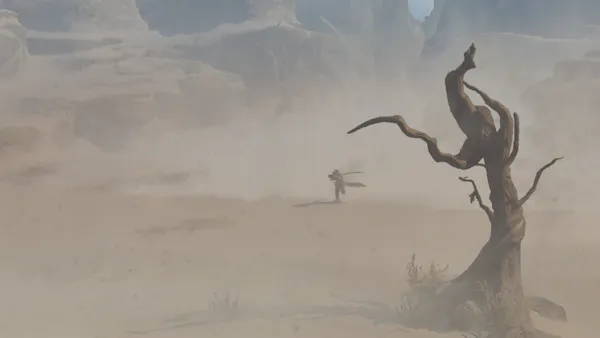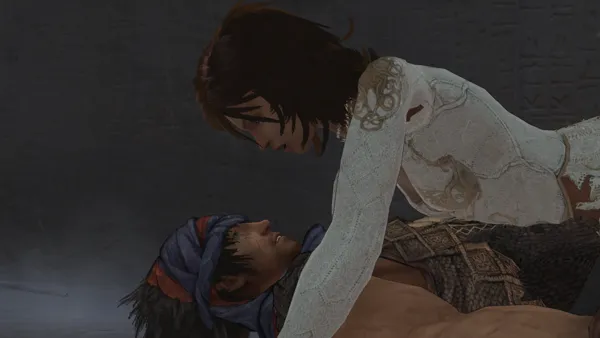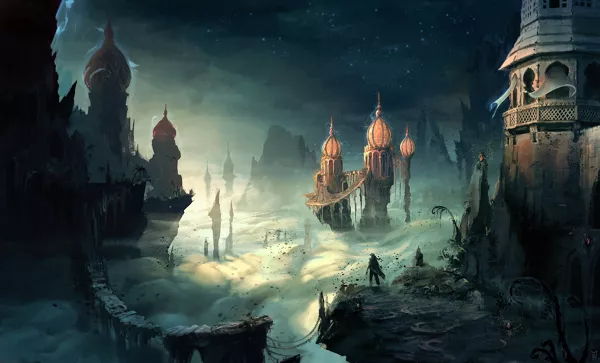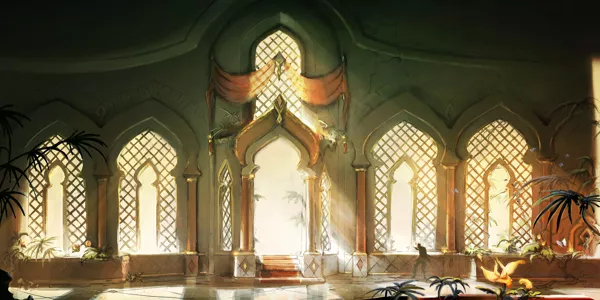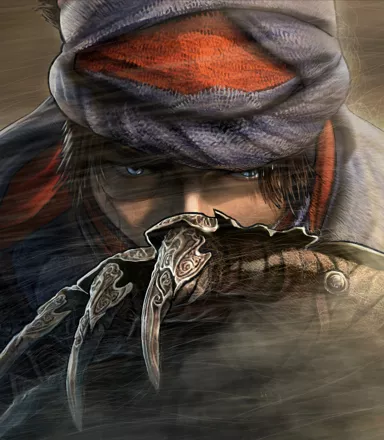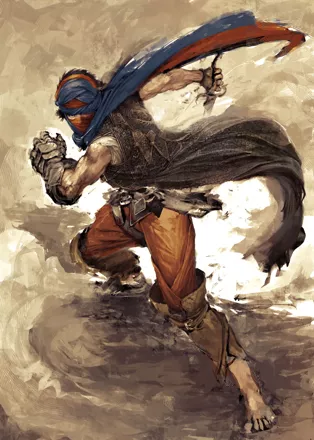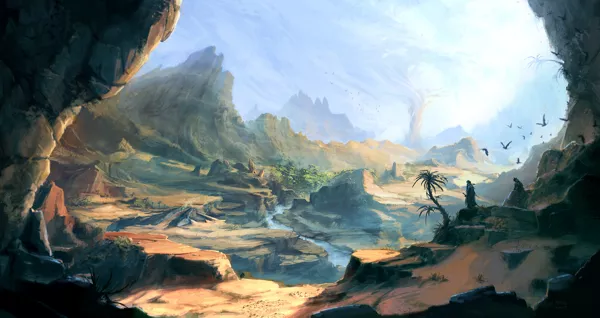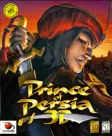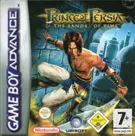Prince of Persia
-
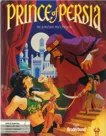 Prince of Persia
(1989 on
Apple II, 1990 on
DOS,
PC-98...)
Prince of Persia
(1989 on
Apple II, 1990 on
DOS,
PC-98...)
-
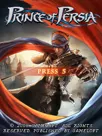 Prince of Persia
(2008 on
J2ME,
Windows Mobile, 2009 on
Android)
Prince of Persia
(2008 on
J2ME,
Windows Mobile, 2009 on
Android)
-
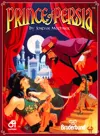 Prince of Persia
(2011 on
Commodore 64)
Prince of Persia
(2011 on
Commodore 64)
-
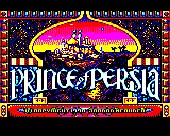 Prince of Persia
(2018 on
BBC Micro)
Prince of Persia
(2018 on
BBC Micro)
Description official descriptions
Prince of Persia once again resets the timeline of the series and marks the start of a new trilogy with the Prince on the search for Farah, his donkey, which is loaded with treasures beyond imagining. But after a sandstorm he falls down into a canyon and meets Elika, a princess with magical powers. She's being hunted by the army of her father and has to make her way to the temple beneath the Tree of Life.
But they come too late. After a brief fight against her father, he breaks the seal and by doing so unlocks the prison chamber that was kept closed by the powers of the Tree of Life. The inhabitant of that prison? Ahriman - God of Darkness. Creator of the darkness of space and the first to unleash envy and hate. Back in the days he was not satisfied with keeping only one half of the universe and after a fierce battle against his brother Ormazd, God of Light, he almost won. In a last attempt Ormazd successfully lured Ahriman into the Tree of Life, condemning him to a thousand years of pain. But Ahriman was only waiting. Waiting and planning and now that he is free, he and his minions are beginning to claim back what they lost and the only two people on the world to stop them are the Prince and Elika.
The basic gameplay remains the same as in the previous trilogy with the Prince engaging in sword fighting, wall climbing, spike dodging, puzzle solving, and more, in his quest to save the world. But as opposed to the previous trilogy, the Prince neither can rewind time nor has to fight multiple enemies at a time. Instead he and Elika only face one, strong enemy every time and if the Prince is about to die because of a miscalculated jump or anything similar, she uses her powers and sets the Prince back to the beginning of the jumping puzzle. That is not the only thing she does. By command of the player, she also helps in fights, allows him to jump further distances by giving him a little push in the back in mid-air and shows which way to go next. Elika is also the key to bring the Tree of Life back to full strength. But to do so, she needs so-called "Seeds of Life" that are scattered all around the levels. If the player has collected enough of these, Elika will also become stronger.
Besides the enemies being stronger, more intelligent and having more special abilities, the fights play similar to the previous iterations of the series with the Prince slashing away at enemies with his sword or his gauntlet to produce powerful combos. The gauntlet also allows the Prince to slide down from solid rocks safely to the area below. The game features Quick Time Events when an enemy got a hold on the Prince and uses a cel-shaded and heavily stylized look for the characters.
Spellings
- Принц Персии - Russian spelling
- 新波斯王子 - Traditional Chinese spelling
Groups +
- 3D Engine: Scimitar
- Games made into comics
- Games with post-credits scene or gameplay
- Japanese PlayStation 3 games with full English support
- Japanese Xbox 360 games with full English support
- Middleware: Bink Video
- Middleware: FaceFX
- Physics Engine: Havok
- PlayStation 3 Essentials Range releases
- PlayStation 3 Platinum Range releases
- Portability Engine: Cider
- Prince of Persia series
- Software Pyramide releases
- Ubisoft eXclusive releases
- Visual technique / style: Cel shaded
Screenshots
Promos
Videos
Add Trailer or Gameplay Video +1 point
See any errors or missing info for this game?
You can submit a correction, contribute trivia, add to a game group, add a related site or alternate title.
Credits (Windows version)
645 People (629 developers, 16 thanks) · View all
| Senior Producer | |
| Producer | |
| Creative Director | |
| Associate Producer | |
| Art Director | |
| Art Production Manager | |
| Animation Artistic Director | |
| Animation Production Managers | |
| Lead Programmer | |
| Lead Gameplay Programmer | |
| Technical Directors | |
| Lead Game Designers | |
| Narrative Director | |
| Level Design Director | |
| Level Design Production Manager | |
| Lead Sound Designer | |
| Lead Camera | |
| Lead QA | |
| Production Manager | |
| Project Closer | |
| [ full credits ] | |
Reviews
Critics
Average score: 81% (based on 106 ratings)
Players
Average score: 3.9 out of 5 (based on 79 ratings with 4 reviews)
The New Adventures of Old Prince
The Good
Cartoonish but great visuals
Simple gameplay
Open-world setting
A great, lengthy story
The Bad
Lack of challenge
Some combat and camera issues
The Bottom Line
Jesus, we've really missed playing Prince of Persia. I bet many of you people have as well. This game is like a whole new chapter for the saga more than a return, and it packs lots of surprises. OK, the visuals are cartoonish, but they are simply great. The gameplay is simple, and it doesn't take much time to learn the basics. The story is packed with thrills and adventure, and you won't get bored, even for 1 single minute, as the story is pretty much long-term. The only things which put us off was the lack of challenge and the combat/camera issues. Sure, the game isn't that challenging, but it's extremely entertaining. This is a pretty memorable return to Prince of Persia.
PlayStation 3 · by Kaan Cakanisik (5) · 2010
Understanding Prince of Persia 2008
The Good
Back in 2003 Ubisoft Montreal introduced us to Sands of Time, an attempt to re-invent Prince of Persia, a 2D platformer that broke all molds in the genre way back in the day, bringing it to the 21st century in full 3D glory.
And what a smashing success that was.
Unless you've been living inside an old leather boot with no windows on a dumpster in the dark side of Pluto, chances are you already know about the wacky antics of this new Prince, what with his beautiful animations and his time-rewinding powers and his crazy, physics-defying acrobatics and his running-along-walls and whatnot. To this day, the "Prince of Persia" trademark became sort of a synonym for "The Arabian Nights meets The Matrix".
There are like three or four people in the world that didn't like
In time, two sequels came along, and while several complaints were issued to both in terms of story and artistic direction, there's no arguing that gameplay-wise the series was getting increasingly better with each new title, with the hero gaining more and more freedom of movement, acrobatic abilities and combat techniques.
Since
Surprisingly (for the folks at Ubi anyway) this re-reboot wasn't quite as well received. In fact, it was met with a solid, consistent, almost universally negative opinion across the board, to the point that today there's much more people out there bitching about how much the new Prince of Persia sucks than people who actually played it. Which is unfortunate, because the game does get quite a few things right.
Now, pretty please with sugar on top, I'll ask you to hear me out and try to keep an open mind during the next minutes, and I'll try to tell you how is it that I came to understand -and ultimately love- this "Prince of Persia 2008". Let's go there.
First off, PoP 2008 is visually stunning. You might argue you're not big on cell-shaded graphics, but there's no denying that the overall design, and very especially the design of the overwhelmingly large gameworld shows some of the most stunning, imaginative, drop-dead gorgeous visuals we've seen in quite a while.
And navigating these areas is an experience on its own: There's no way any red-blooded human being could stand indifferent to the exhilarating spectacle that each jumping puzzle becomes. At a certain point in the game, Elika gains the ability to fly across more-or-less short distances, and if you can watch those flights, with our crazy couple rocketing up to the sky, diving until almost hitting the ground and at the very last minute propelling upwards again, all of the while cruising through (and sometimes barely avoiding) gigantic mountains and columns and walls and whatnot, and you can remain indifferent to what you're seeing, then I'm afraid you can't possibly have a soul. Go get an exorcist or something.
While the game progression is absolutely linear, for the first time in the series each area has several paths the player can navigate at will. Doing so has an immediate payoff since there are these "light seeds" strewn about all over the place, and you want to collect as many as you can in order to unlock special powers and a few freebies; but -at least for me- the very navigation was a prize on its own right. I couldn't get tired of watching the protagonist run, fly, swing and jump around the beautiful environments.
So, from a strictly visual standpoint, PoP 2008 is a masterpiece.
Secondly, I don't think the storytelling got the attention it deserved.
As you might know,
It is true, the hero of the new game is a self-absorved fratboy that takes every opportunity to hit on Elika with the cheapest pick up lines imaginable, and she in turn can get so uptight you'll want to rotate the camera around just to make sure she doesn't have a broomstick up her ass; but trust me, as someone that's big enough a fanboi as to having played the entire series over and over again to the point I could almost recite the dialogues by heart, I assure you the unforgettable, adorable characters in
Especially if you're willing to take the time to know them.
You see, PoP 2008 takes it one step further and includes the possibility to trigger short conversations between the characters at the player's will. Some of them will give you gameplay clues, but most serve no other purpose than to teach you about the character's backgrounds, or simply show them slowly build a relationship; more often than not via random, casual dialogues ("OK, enough about me, it's your turn: I want to know about your parents now") and silly games one might get into while briefly stopping to catch their breath or simply trying to alleviate the tension.
This mechanic, giving the player the decision to dig deeper in order to uncover details that, while not necessary to understand the main story, do help fleshing out the gameworld and especially the characters, reminds me of games like
As I see it, these sort of gimmicks are a welcome departure from classic gaming storytelling (i.e: interrupting the flow of gameplay with large chunks of text or lenghty cutscenes), and they not only make games appealing for different playing styles, but also can make a replay all the more enjoyable.
OK, I hear you, enough with the fanboyism already, let's get on the meaty, more controversial aspects of the game once and for all.
The complaints you most likely saw all over the place were always the same, so we'll adress them one by one in a handy list format:
• "Meh, it's so easy it's no match for my 1337 g4m0r sk1lls" - I've been gaming for over 20 years; the only, rare ocassions when I don't beat a game is when I despise it so much I can't be bothered to do so; and I thought the difficulty level was on par with current standards. PoP 2008 is easy, but then I've been bitching about how easy games in general have became for no less than four or five years. With the honorable exception of
• "ZOMG it's a kiddie-friendly piece of shit YOU CAN'T DIE!!!!!!!1111!!1" - This is the most frequent complaint and, unless behind those words there's some elaborated reasoning that escapes me, it's also the less thought-out, blatantly stupidest sentence to be echoed over and over in the history of the written word. Here's the thing: Elika, the female sidekick, is integrated into the gameplay so that, with the press of a button, you can summon her and her oh so magical powers of whatever to give you a little boost in a difficult jump or to lend a hand in combat. At some point during the pre-mating rituals between press, developers and public, someone at Ubisoft merrily explained that Elika would also jump into action by herself whenever the protagonist faced a certain death (like, say, a miscalculated jump), rescuing him at the last minute and thus making it effectively impossible to die. I bet the poor guy is wishing he kept his head stuck up his own ass because, boy, did that statement stir up the beehive.
Now the truth is, while Elika does jump into action whenever you make a bad jump / you get badly beaten up by an enemy, what she does is teleporting you to the beginning of the jumping puzzle you were in / get you away from the enemy, which while does indeed save your life, also forces you to restart the puzzle / gives the creature the chance to recover a percentage of his health. In other words, Ubisoft's whole "effectively-impossible-to-die" stravaganza is nothing more than a slightly original-ish checkpoint system. An alternative to the time-rewinding powers in
You can argue there are too many of these "checkpoints" which makes the game barely challenging, but then we're back in the first point of the list.
• "Dude, gameplay is so simplistic the controller might as well have one single button" - Now we're getting somewhere. This is one point I sort of agree with. The gameplay is undoubtedly simplistic, certainly way more simple than in any of the previous games. Beating a jumping puzzle or a fight basically comes down to pushing the right button at the right moment. Unlike previous installments where you had an insane amount of moves and combos (especially for combat), a lot of actions have been comprised into a single button, and the protagonist will behave differently according to the context he's in. In fact, certain points in the environment have this "magnetic" quality, so that you need to make a really, really bad jump in order to not safely land on the proper spot or grab the proper pillar or ledge or whatever. At times it almost feels like an interactive movie, and then the game throws in a quicktime event and you barely notice it, it fits the flow of the gameplay so naturally.
And I'll tell you something: During my first few hours of playing, I was beginning to hate the game precisely because of this. I was like, "Fuck damn, what am I even doing here? This game pretty much plays itself!!! ò__Ó ". But then I realized that PoP 2008 is a game that mainly aims to offer a visual impact. I realized that complicating the control interface would interrupt the flow of the animation, thus breaking the spectacle. I realized that PoP 2008 is, in short, a game for sightseeing.
Which takes me to the last point: Whenever I discussed this game with someone, the moment I seemed to get the upper hand my opponent would inevitably shut the conversation down with something like ...
• "Look, man, any one of the previous PoP's can whip this one's ass seven ways from Sunday, so there" - ... and that, frankly, is a logic I couldn't argue with. At best, I could argue that PoP 2008 is not strictly worse, it's just different...
And then it hit me: This is not a Prince of Persia.
You see, the game plays only marginally similar to previous installments, the main character is not a prince, and the setting doesn't remotely resemble any real location, Persian or otherwise. Other than the wall-running and the saracen blade, there's virtually nothing to connect this game to the series it supposedly belongs to. Calling this game "Prince of Persia" is just as wrong as if they had done it with, say,
Come to think of it, this game is closer to
And that is the main point of the whole question. In order to appreciate this game, it's mandatory to not think about it as part of the Prince of Persia series, regardless of rebootings or re-rebootings; because, for better or worse, it's something else altogether.
The Bad
Like you already guessed, o clever little thing as you are, I like this game. So much so that where other people see glaring flaws and horrible mistakes, I perceive conscious design decisions that I applaud for the most part. However, that's not to say I don't have a gripe or two.
First, I'm still hovering somewhere between the first and third complaints from the list we just analyzed: The game is definitely too easy for my taste. The fact that this is commonplace in today's gaming market doesn't make it less bad. And while I think that the simplistic gameplay was a right move to keep the animations fluid and uninterrupted, I also think that a little more complexity wouldn't have hurt. I'm all for the sightseeing-oriented gameplay, especially when the sights are as beautiful as these, but man, I want my games to give me some challenge too. At the very least, PoP 2008 needs more -or at least longer- jumping puzzles, and it definitely begs for a more complex battle system.
And while we're at it, more challenging enemies too. Especially the small, regular enemies are impossibly easy: Not only you have the unexplainable chance to prevent them from even showing up, thus eliminating the fight altogether, but more often than not you'll pull a combo that unexpectedly drains 75% of the creature's health, wiping him off before you even know what happened. The enemies do eventually learn to block your attacks as a form of offering a challenge, but in practice this only means that you're limited to using the two or three tougher combos from the list, which was already small to begin with.
I already said I love the visual aspect through and through, I'm in love with everything from concept art all the way to the cell-shaded rendering; but the enemies... Eh... The thing is, the evil in this game comes in the form or some black, oily substance (resembling the Black Cancer from The X-Files) that spreads all over the world, and even the enemies are made of (or covered in) this filthy goo of sorts. The problem is that, this way, enemies (especially the afforementioned regular, wimpy ones) are pretty much a generic semi-humanoid black blob, and adding that to the fact that there are only three or four different types, it feels like someone dropped the ball here.
Finally, the ending. Not the ending itself, but the way you get to it.
No spoilers, but at the end of the game, after one of the most adrenaline-pumping, massively epic boss battles in the history of gaming, a brief cutscene takes place, the credits roll and then the protagonist is faced with a choice. Once he makes his decision (which you have no saying in), you take control of him again and you're required to do a certain thing. In practice, this translates in an impossibly long, mind-numbingly boring walk towards a certain point and then back to where you parted from. This obligatory section has no challenge, no puzzles, no real choice to be made, absolutely nothing. All you're required to do is to hold the stick up for what feels like a hundred years, then push a button, and then hold the stick up again for another century, and then the ending proper takes place. And then the credits roll, again.
I can't explain you how impossibly infuriating this section is. Suffice to say that, as much as I loved the story and as eager as I was to see its conclusion, I don't feel able to give an opinion about the ending because I was so pissed off when it finally happened that I'm not even sure how I felt about it.
I don't know what the fuck they expected to achieve by making this last chore of a scene a playable one, but if the goal was to annoy the player so much that he ends up losing any attachment he had to the story only a few minutes before and thus ruining the overall experience, then congratulations, you've made it. I hope you're happy.
The Bottom Line
I have this theory: Ubisoft thought that by strapping "Prince of Persia" on their newest platformer they would assure a large, eager fanbase right off the bat for it; a safety cushion for sales, if you will. After all, it was a game about a guy with a saracen sword who runs along walls, right? Prince of Persia fans would buy in no problem. Why wouldn't they?
But the plan backfired when fans went in expecting an actual, proper, full-fledged new Prince of Persia that followed the tradition of the series, and they found something completely different; so much so that it even takes some big steps back in areas where the series had been consistently moving forward from one chapter to the next.
I guess it goes to show all marketing people should be put in a tin capsule and shot into the sun.
That said, I think PoP 2008 is a good game. In fact, I think it's a great game. But it's not a Prince of Persia. I can't stress that enough: It's something you need to get inside your head if you ever expect to enjoy it.
Me, once I made my peace with that fact, I discovered a beautiful, breathtaking and imaginative visual experience as we rarely get to see in this day where everyone and their dog will go for the photo-realistic brown-yellowish appearance they like to call "next-gen" (or "current-gen", whatever). Pair those visuals with a beautiful, smooth animation and a simple yet clever and engaging storytelling, and you're in for quite a ride.
Like I said somewhere up there, had they named this game something like Dragon's Lair 2008, it would've been a resounding success.
They might've needed to throw a dragon in there, though.
Windows · by Slug Camargo (583) · 2009
Some impressive tricks and handsome looks can't save this banal Prince.
The Good
Back in 1989 I discovered a little gem by the name of Prince of Persia and it quickly became one of my all time favourite platformers. It had a sequel too, that was awesome as well. However the series seemed dead after a terrible attempt to update the game in 3D. I was skeptical when Ubisoft made the decision to try another 3D Prince of Persia game, but what a pleasant surprise, Sands of Time was a great game, and so was its first and second sequels, even if the jump to a violent brooding anti-hero was a stark and disappointing contrast to the charm of the first title.
So, despite the lack of originality in the name, I was looking forward to Ubisoft's next entry into the venerable series.
When starting the game up, one of the first things you will notice are the graphics and the art design. This game is downright GORGEOUS, and its visuals are very fresh. We live in a time where graphics are often gray and attempting to be "realistic," and this is one of the most violent eras in video gaming so most gamers are used to putting up with shattering bones and spilling blood, and I'm fine with gore, in fact I think it can be therapeutic and entertaining, but when you are so used to brutality and straight faced sci-fi or black fantasies, its fresh to step into something a little more appealing, and that is something that the new PoP does with grace.
The art design is dream like and looks as if it were laid down by a brush rather than a computer rendering station, and you will see bright, appealing colours that gives the game a magical and enchanting look. You won't see any oozing horrors or disemboweled corpses and as I said, its fresh to take a break and look at a game that is beautiful in a literal sense. I am embarrassed to admit this because I usually only find myself attracted to real women but Elika is quite easily the first female in a video game that I found beauty in when it comes to her visual design; I also like bare feet. Sorry if that's TMI..
The games setting, in case you didn't guess by the title, is ancient Persia. The plot is relatively simple. A princess named Elika was killed, and her father begged an evil Djinn (The proper spelling of "Genie" for those who do not know.) known as Ahriman to save her life. Ahriman grants this wish, and brings Elika back, but the price is if she is to remain alive the Sultan must free Ahriman. This turns out to be a bad idea (Surprise surprise) and Elika, who has the powers of the god of life Ormazd (Who is the one that imprisoned Ahriman) tries to stop her father but arrives a little too late. As the nameless Prince, you are wandering the desert looking for your Donkey, Farah (Oh ho, I see what you did there. >__>) and discover Elika when she is being chased by her fathers guards.
Elika in tow, you must save the world from Ahriman's darkness by spreading life across the land with Elika's powers. The story has problems, but the world is beautiful and there are nice undertones of mythology that give the game a unique, dream like feeling. Bringing a land back to life is an awesome sight thanks to the art, and at the same time seeing shadows crawl against the walls and grab at you is eerie and yet a wonderful effect. The game has a very dream like appearance and feeling, which makes the game a little more inviting.
There are a few good puzzles.
The controls are superb. Just about anyone can jump in and learn how to run across walls and swing from ledge to ledge in seconds with ease, thanks to Ubisoft's perfection of platforming controls using the Scimitar engine. With just the press of one or two buttons, you can perform exciting acrobatic tricks and leaps of faith and it all feels natural and is great to look at thanks to terrific animation. There are times where you forget there is a controller between you and the game and platforming can be very satisfying on occasion thanks to the intuitive controls.
The Bad
The game, sadly enough, has too many problems to make it worth your time. Firstly, the Prince needs to be hurled into the sun. I had a long ponder thinking who would be a more annoying flatmate, Naruto or the Prince and I think I'd rather put up with Naruto. At least Naruto has a purpose because if someone is coming to kill you Naruto would at least be able to pull a stupid magic power out of his ass and save you. The prince is not only annoying, he has no purpose in this game whatsoever.
I'm serious, The Prince is completely useless and has nothing to do with the task at hand. He contributes nothing. Sure he can run across walls, but Elika shows that she can run across walls too and arguably at faster speeds, and she also shows powers of levitation and the ability to reach higher places. The prince doesn't do anything to save the land from Ahriman, Elika does all the saving of the world by healing the land, in fact Elika saves the princes sorry ass and save for one obligatory kidnapping scene the prince never does anything to aid Elika, he may fight bad guys and he has that claw and sword, but Elika usually finishes off the bad guys with magic and her magic does more damage than the princes weapons. So why do we need The Prince? Elika is a better character, and she is the only one contributing to saving the world! The game should've been called "Princess of Persia" and been about Elika.
That, and he spouts annoying anachronisms consisting of one liners and pop culture references. There's a scene where he starts showing off like the pompous, cocky prick that he is and shouts "Thank you, thank you for coming to tonight's performance of the classic play, "DEATH OF A CONCUBINE." See, it's funny because this game is set in ancient Persia and Death of a Salesman wasn't written until the 20th century. Oh wait, that's not funny. A note to Ubisoft: Shrek was a funny movie. I'm glad you thought so too, but this is Prince of Persia, not Shrek so leave out the anachronistic pop culture gags, mmkay?
The design is all over the place. The game is a sandbox. Let that statement sink in for a moment and you will realize how stupid an idea it is to make a platforming game a sandbox game. I'm sure someone will argue that the far superior Assassin's Creed games pulled this off, but while Assassin's Creed does have plenty of platforming sections and the ability to freerun across roofs and climb towers, it is not a platformer so much as it is an action/adventure game. Prince of Persia is a straight up platformer, based entirely on the concept of platforming and performing acrobatics.
Applying a sandbox world to a game like this is a terrible idea for numerous reasons. One of the most obvious reasons is the fact that, as fun as the platforming can be at times, you will run into constant repetition. If the game had a linear path progression, each new area would have new platforms and tricks to perform to keep the flow going. Backtracking through all the same platforms gets tiresome and feels like a chore, and it doesn't help that an unintuitive map leads to confusion so you will often go through an entire section trying to get to your next point and find out that path isn't valid or its not unlocked so you will have to go back and start over to find a different path. I'm reminded of the fact that one could reverse death in Sands of Time, and maybe they should've allowed players to do that so they wouldn't have the constant tedium of backtracking through massive areas and would be able to rewind to the start of an area.
The game also forces you to back track and beat the world into repetition because of items you must collect. It is normal for a sandbox to have items scattered around that you can search for and collect and it adds an exploration element but it is all left to the players leisure. But in this game, you must collect every single one to progress. GTA III didn't force players to collect a specific number of hidden packages before they could start the next mission. It is tedious wanting to go to a new area, but finding you can't because you don't have enough stinking orbs and you have to run all the way back and try to get the orbs hiding at the top of a floating tree halfway into space, and it doesn't help that when you get enough orbs to complete a section, the game takes away your orbs and you have to start recollecting and the orbs don't regenerate.
The sandbox design also means that the levels are all over the place, and is about as easy to navigate as the Bermuda triangle. If each area were progressed in a linear manner this wouldn't be a problem, but as it is you can hardly find your way around even when Elika shines a light to your map marker because you can't memorize what platforming section leads to what and will often end up in the wrong area, and this is especially complicated when you haven't collected enough orbs to unlock a section and accidentally wander into a section that you aren't allowed in.
The game is too easy. You could beat the game playing with your feet and never die or feel the sting of an enemies blade a single goddamn time. Every time you fall, Elika picks you back up and she does the same if you run into one of Ahriman's shadows that try and gobble you up, and every time an enemy gets too close for comfort Elika just blasts them away from you with magic. In The Sands of Time, it was a nice feature to be able to rewind and fix your screw ups but it was balanced because you had limited sand and your character could still potentially die.
As frustrating as death can be, Prince of Persia is all about trial and error as well as learning from mistakes. The first two games were practically games of memory, you had to memorize what floor had spikes and what ledges led to a platform or a pit. What makes the original, and even Sands of Time, PoP games so exciting is the fact that you know death is clinging on your back so hard you could sue him for sexual harassment, and when you managed to skip over a yawning chasm of doom and give Death a big middle finger you would get a rush of adrenaline and a sigh of relief. Death is quite possibly the most important aspect of Prince of Persia, and removing it means you will never have that excitement of defying death which makes the game dull and takes out any enjoyment the platforming can bring all too quickly. The banality of this game is disappointing, only an hour or two in you'll have seen all there is and the platforming will become dull and predictable, and you'll soon become bored of seeing Elika save the Prince from death and won't even care about trying not to fall to your non-existent doom because you know Elika will just push you back up onto the platform you were trying to reach.
The Bottom Line
This new Prince has a few impressive tricks up his sleeve, and he certainly looks handsome and appealing, but when he opens his mouth and tries to invite you into his home you'll realize you've seen it all before and his tricks get stale and his annoying sense of humour reveal a poor personality. It's disappointing seeing what glimpses of goodness are in this game, you certainly wish you could see more of his lovely wife and less of him and that his family architect had paid more attention to the fine details of his home but sadly it just isn't there and the spark only lasts so long.
Well, I'm running out of metaphors to beat to death, but all you need to know is that Prince of Persia is a disappointment. Platforming is fun for awhile and it looks good, so it might make a decent rental but it simply has no staying power and so many bad design choices ruin what could've been a wonderful title.
Xbox 360 · by Kaddy B. (777) · 2010
Trivia
Awards
- GameSpy
- 2008 – #5 Xbox 360 Game of the Year
- 2008 – #7 PS3 Game of the Year
- 2008 – Special Achievement in Art Direction Award
Analytics
Upgrade to MobyPro to view research rankings!
Related Sites +
-
Prince of Persia
Official website. -
Review: The Mac Gamer
A review of Prince of Persia by The Mac Gamer's Alex McLarty (September 20th, 2009). -
Something Old, Something New
An Apple Games article about the Mac version of Prince of Persia with additional comments from the Creative Director. -
X360A achievement guide
X360A's achievement guide for Prince of Persia.
Identifiers +
Contribute
Are you familiar with this game? Help document and preserve this entry in video game history! If your contribution is approved, you will earn points and be credited as a contributor.
Contributors to this Entry
Game added by Sicarius.
OnLive added by firefang9212. Macintosh added by Zeppin.
Additional contributors: MichaelPalin, Zeppin, Klaster_1, —-, Paulus18950, Patrick Bregger, Starbuck the Third.
Game added December 13, 2008. Last modified March 24, 2024.
